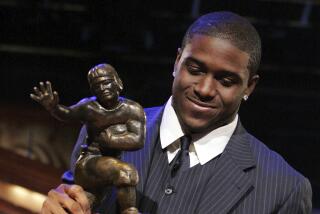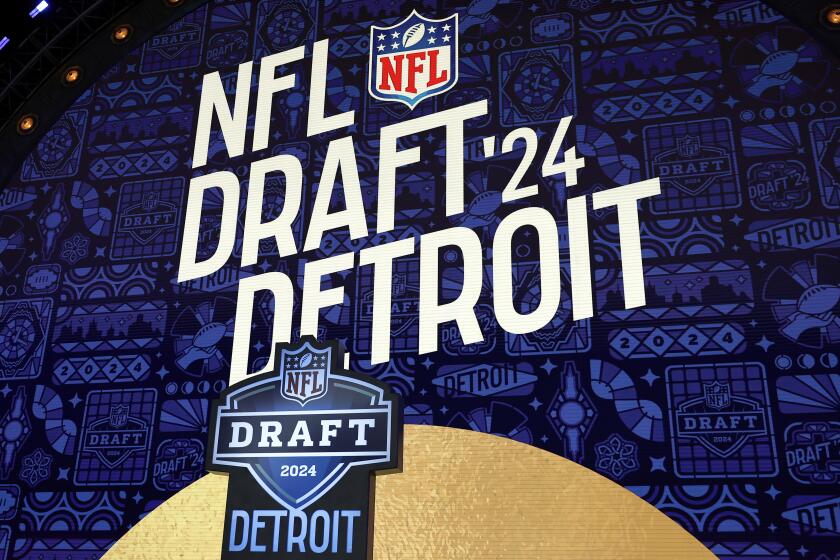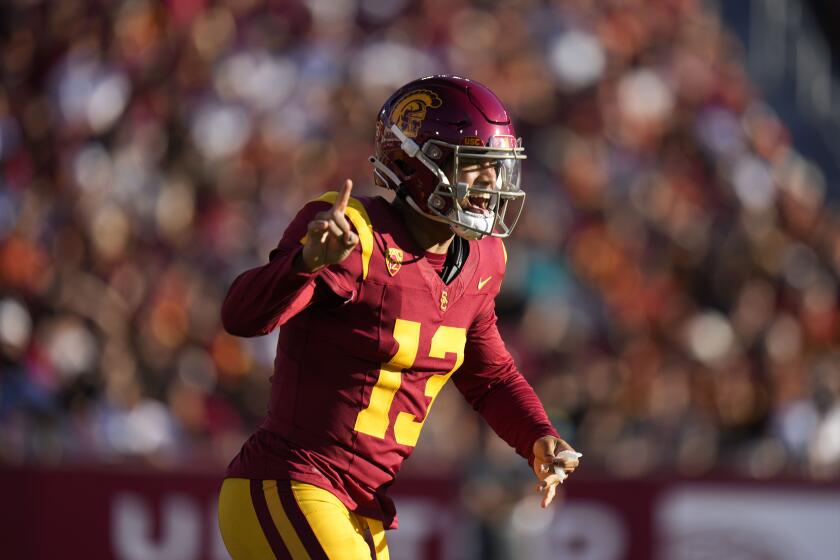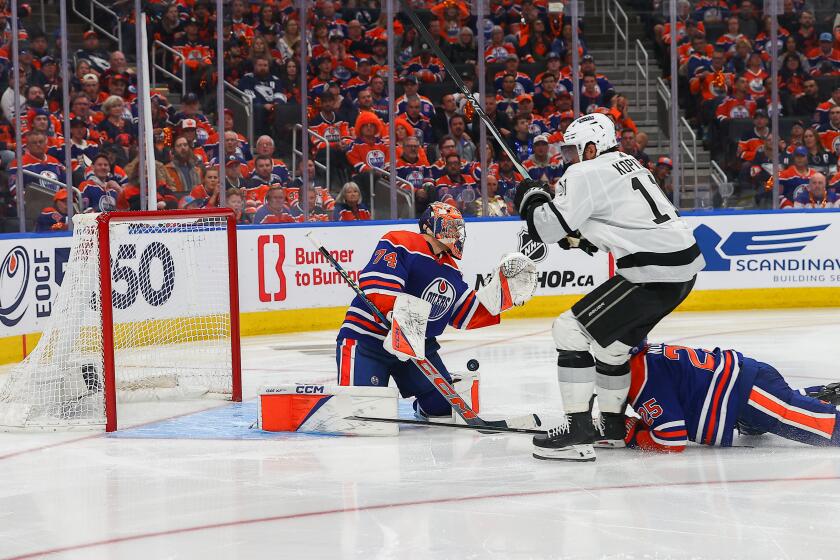Flatbush-whacked
The Dodgers leaving Brooklyn?
It was as inconceivable as the Notre Dame Fighting Irish leaving South Bend, Ind., the Packers leaving Green Bay or the Statue of Liberty being moved to Lake Michigan.
Yes, Brooklynites understood Ebbets Field was decaying and knew owner Walter O’Malley was frustrated by his inability to get New York city commissioner Robert Moses to approve O’Malley’s plan for a new stadium. They had heard the rumors about Los Angeles.
And yet when conjecture became reality, it hit everyone hard, from fans on the street and in the seats to team personnel on the field and in the front office.
The resulting emotion is expressed in the memories that follow of those tumultuous times for a borough and its team:
Buzzie Bavasi, former Dodgers general manager: “Walter’s attitude was, ‘If it’s 30 miles from Brooklyn, it might as well be 3,000 miles.’ Flushing Meadows was not Brooklyn.”
Billy DeLury, who has served in the Dodgers organization for over half a century: “It just wasn’t fair. If I want to build a house and this is where I want to build it and someone says, ‘You don’t build a house unless I tell you where to build it,’ I don’t think that’s right. And that’s what happened with the ballpark.
“Would you have to change the name to the Flushing Dodgers? I really, truly think Moses thought we would never leave.”
Bavasi: “None of us blame Walter because we realized Ebbets Field needed a lot of work. My sister’s father-in-law was the fire commissioner for Brooklyn. He could have condemned Ebbets Field, but because of his relationship with me, he told me to just do a few maintenance things and it would be all right. But even with that, it cost us plenty of money because we had to do a lot of work. To get it into condition where it would have been approved by the city would have cost us millions and we didn’t have the millions at that time.”
Financial details, however, were not the main concern of Brooklyn fans.
Boxing promoter Bob Arum, who grew up in that borough: “When I think of Brooklyn, the only thing that really mattered was baseball. Ebbets Field was less than a mile from where I lived. It was 25 cents for the bleachers. They used to play a lot of doubleheaders, so our mothers packed lunches because we would be there for eight hours.
“The players lived in the area you lived. [Manager] Charlie Dressen lived a few blocks away. You’d see the players in restaurants. There was a pitcher, Freddie Fitzsimmons, who had a bowling alley. It was really more than just a team.”
TV host Larry King, another Brooklyn native: “I still remember the aroma of Ebbets Field. I was at Jackie Robinson’s first game. Sat in the bleachers. It was a scene I’ll never forget. The bleachers were the best because they were so close.
“The Dodgers were the symbol of Brooklyn. They gave us an identity, set us apart from Manhattan and Queens. When you lived in Brooklyn, everything else was Tokyo.”
Joan Hodges, the 81-year-old widow of Gil, the Dodgers first baseman: “My parents came from Italy and didn’t know a baseball from an onion. But by the time Gil was managing the Mets, my mother would ask him: ‘How come you take so long to take the pitcher out?’ ”
Current Dodgers announcer Charley Steiner, another native New Yorker: “Brooklyn was a conclave of immigrants of every nationality and religion: German, Polish, Russian, Irish, Italian, Catholic, Jewish. Our grandparents had a funny accent because they were from the old country, but the one thing they all had in common was the Dodgers. That was Brooklyn.”
But as the 1950s wore on, that was changing.
Arum: “Many families were moving to the Long Island suburbs like my folks did because they could afford it and it offered a better quality of life. It had nothing to do with racism. It was less cramped and you could own your own home out there.
“Unlike Californians, those people were not acclimated to vehicles. They had no desire to drive back into the city, so O’Malley needed a stadium that was close to public transportation.”
When he couldn’t convince Moses to sign off on his dream stadium, O’Malley pushed ahead in negotiations with L.A. officials.
Bavasi: “The office staff took a vote. It was 8-1 against the move. Of course, the one vote was O’Malley’s.
“We were all New Yorkers. I lived in Scarsdale, 25 miles north of the city, all my life. Among the other front-office guys, Fresco Thompson lived in the Bronx. Al Campanis graduated from NYU and lived close to the university, and Harold Parrott lived in Far Rockaway. Nobody wanted to move. Most of our players didn’t want to go either. We had children in school. It was depressing.
“But I had one of 16 jobs [as major league general manager] in the world. I couldn’t say no. Where was I going to get another job like that? We couldn’t deny the fact that we had to go, but I think, if somebody had come by and offered us similar jobs, we would have taken them. We wouldn’t have gone.
“The boys who were New Yorkers -- Carl Furillo, Don Newcombe, Roy Campanella -- were worried about being accepted in California the way they had been in Brooklyn. Furillo never understood what it was like to be a Californian. There was nothing like a New Yorker to Furillo. It affected his game.
“We should have given the players more money for coming out to California, but I wasn’t about to give anybody more money.”
Dodgers pitcher Don Newcombe: “I wanted to move because I was in the midst of a divorce and I wanted to get out of town.”
Dodgers outfielder Duke Snider, who was from Compton: “I was not happy to move because I was born in Brooklyn as far as baseball was concerned. But it was a good move. No question about that. If the team had to move somewhere, I’m glad it was Los Angeles.”
While the Dodgers grudgingly accepted the inevitable, the fans, one fan in particular, resisted.
Steiner: “I had been hearing that the Dodgers might move, but, at 8 years old, what did I know about a team moving? Where are they going? The West Coast was somewhere over the rainbow to me. L.A. might as well have been Saturn, it was so far away. It was incomprehensible.
“Late in September, I called Walter O’Malley’s office. I was scared to death. I went upstairs, picked up the phone in my parents’ bedroom, called information and got the number of the Brooklyn Dodger offices. I got through to a woman who was presumably his secretary, and told her I’d like to talk to Walter O’Malley. ‘What would you like to talk to him about?’ she asked. ‘They shouldn’t move. I think this is bad,’ I said, and then rambled on incoherently. She said, ‘We will try to have Mr. O’Malley get back to you.’ Needless to say, I’m still awaiting the call.”
The response from O’Malley that Brooklynites had been dreading finally came 50 years ago today, Oct. 8, 1957, one day after the Los Angeles City Council approved a contract with the Dodgers.
It came in the form of a press release handed out to reporters in a Brooklyn hotel by public relations director Red Patterson with no other Dodgers official in sight.
It was official. The Brooklyn Dodgers would become the Los Angeles Dodgers.
Bavasi: “Walter wanted Moses at the press conference, but he wouldn’t show up. None of us showed up.”
Tom Lasorda, identified with Dodger blue for more than 50 years: “I was driving my car on my way to Key West, Florida, to go to Cuba to play winter baseball when I heard about the move on the radio. I could not believe it. I was dumbstruck, but it turned out to be the greatest move that ever happened in baseball. It showed the vision Mr. O’Malley had to bring the team here.”
Bavasi: “I guarantee you, if you walked down Montague Street, where our offices were, on Oct. 7, you wouldn’t have found two people who believed we were going to move. They laughed at the idea. No chance.”
But the laughter quickly dissolved into tears.
Bavasi: “The day we announced we were leaving was my mother’s birthday. We took her to Leone’s restaurant in New York. I forgot about California for the night. My mother knew I was depressed. She said a Hail Mary that maybe something would happen so we wouldn’t be going to California.”
But Brooklyn’s prayers were not to be answered. And reality proved harsh.
It was O’Malley who received the harshest treatment from disenchanted fans.
King: “I’m going to tell you a popular joke from that time, and, if you were in Brooklyn in the late ‘50s or early ‘60s, you’ll know the punch line before I finish.
“You’re in a room with Adolf Hitler, Josef Stalin and Walter O’Malley. You have a gun with only two bullets. What do you do?
“The answer: You shoot O’Malley twice.”
Steiner: “Walter O’Malley was the guy in the black hat who led the wagon train out of town.”
Joan Hodges: “That’s all changed. People realize it was Moses, not Walter O’Malley. They come up to me now and say they almost feel like they have to apologize. I tell them, it’s never too late.”
But even absolving O’Malley doesn’t ease the pain the faithful still remember from Oct. 8, 1957, the blackest day in Brooklyn sports history.
Arum: “You felt an emptiness. Now it was final. Something that had been an integral part of your life from the time that you were a young kid, from the time you started to go to school, was now gone, never to be returned. But that time, my folks were leaving Brooklyn to go live on the island and I was leaving Brooklyn to go live in a Manhattan apartment. The Brooklyn boat had sunk and everybody was leaving the ship.”
Steiner: “It was always fascinating to me that, after the Dodgers left, there was an emotional pain, an emotional connection that lives to this day for the survivors, but never existed when the Giants left New York or when the Braves left Boston. Here it is 50 years later and there is still that bridge, that rope, that tie, whatever it is, between the Dodgers and Brooklyn. The Dodgers are one of many entertainment options in this megalopolis called Los Angeles. The Brooklyn Dodgers were the lifeblood of the community. That’s the difference.
“It was so sad when they left. The Dodgers were like family. I felt like an abandoned child. Then, suddenly, opening day ‘58, they’re not there. That’s when it really hit me.”
--
More to Read
Get our high school sports newsletter
Prep Rally is devoted to the SoCal high school sports experience, bringing you scores, stories and a behind-the-scenes look at what makes prep sports so popular.
You may occasionally receive promotional content from the Los Angeles Times.






